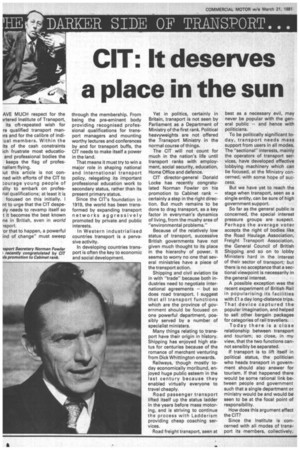CIT: It deserves a place in the sun
Page 46

Page 47

If you've noticed an error in this article please click here to report it so we can fix it.
AVE MUCH respect for the utered Institute of Transport, its oft-repeated wish for re qualified transport manirs and for the calibre of indiual members. Within the its of the cash constraints ich frustrate most educatioand professional bodies the keeps the flag of profesnalism flying.
lut this article is not conned with efforts of the CIT to :..ourage young people of ility to embark on profesnal qualifications; at least it is focused on this initially. I nt to urge that the CIT despealy needs to revamp itself so t it becomes the best known ne in British, even in world isport.
Or that to happen, a powerful ind of change" must sweep
through the membership. From being the pre-eminent body providing recognised professional qualifications for transport managers and mounting worthy lectures and conferences by and for transport buffs, the CIT needs to make itself a power in the land.
That means it must try to win a major role in shaping national and international transport policy, relegating its important professional education work to secondary status, rather than its present primary status.
Since the CIT's foundation in 1919, the world has been transformed by expanding transport networks aggressively promoted by private and public interests.
In Western industrialised countries transport is a pervasive activity.
In developing countries transport is often the key to economic and social development. Yet in politics, certainly in Britain, transport is not seen by Parliament as a Department of Ministry of the first rank. Political heavyweights are not offered the Transport Ministry in the normal course of things.
The CIT will not count for much in the nation's life until transport ranks with employment, social security, education, Home Office and defence.
CIT director-general Donald Locke has recently congratulated Norman Fowler on his promotion to Cabinet rank — certainly a step in the right direction. But much remains to be done to drag transport, as a key factor in everyman's dynamics of living, from the mushy area of "environmental problems."
Because of the relatively low status of transport, successive British governments have not given much thought to its place in the hierarchy of power. It seems to worry no one that several ministries have a piece of the transport action.
Shipping and civil aviation tie in with "trade" because both industries need to negotiate international agreements — but so does road transport. I suggest that all transport functions which are the province of government should be focused on one powerful department, possibly served by a number of specialist ministers.
Many things relating to transport have their origin in history. Shipping has enjoyed high status for centuries because of the romance of merchant venturing from Dick Whittington onwards.
Railways, though mostly today economically moribund, enjoyed huge public esteem in the last century because they enabled virtually everyone to travel cheaply.
Road passenger transport lifted itself up the status ladder in the years before mass motoring, and is striving to continue the process with Ladderism providing cheap coaching services.
Road freight transport, seen at best as a necessary evil, may never be popular with the general public — and hence with politicians.
To be politically significant today, transport needs mass support from users in all modes. The "sectional" interests, mainly the operators of transport services, haNie developed effective lobbying machinery which can be focused, at the Ministry concerned, with some hope of success.
But we have yet to reach the stage when transport, seen as a single entity, can be sure of high government support.
So far as the general public is concerned, the special interest pressure groups are suspect. Perhaps the average voter accepts the right of bodies like. the Road Haulage Association, Freight Transport Association, the General Council of British Shipping and so on to lobby Ministers hard in the interest of their sector of transport; but there is no acceptance that a sectional viewpoint is necessarily in the general interest.
A possible exception was the recent experiment of British Rail in popularising its facilities with El a day long-distance trips. That device captured the popular imagination, and helped to sell other bargain packages for categories of rail travellers.
Today there is a close relationship between transport and tourism; so close, in my view, that the two functions cannot sensibly be separated.
If transport is to lift itself in political status, the politician who heads transport in government should also answer for tourism. If that happened there would be some rational link between people and government such that a single department or ministry would be and would be seen to be at the focal point of responsibility.
How does this argument affect the CIT?
Since the Institute is concerned with all modes of transport its members, collectively, are likely to have been responsible for a large proportion of all transport activity, particularly in mass transport and tourism.
Remembering the high value placed by the Institute on professionalism, this suggests that the ' Institute should become an indispensable link between "consumerism" — the man in the street — and the transport operators?
And with this expanded role the Institute could become much more significant to the Minister or Secretary of State responsible for transport and tourism.
It is too easy for members of a prestigious body like the Chartered Institute of Transport to take for granted its self-appointed role as an examining body concerned to promote high standards of professionalism.
Clearly, the more people in transport who have proved their competence by study and wide experience the better for the status of the total industry.
From the public standpoint however, the professionalism of individuals within transport may not matter a fig. What the public is concerned with is service, with a capital S.
If those operating a transport service are academically unqualified, but the service is good, then it will be supported.
Conversely, however many corporate members of the CIT grace the boardrooms and traffic desks of a transport organisation, if it provides poor service then the public will condemn it. The word Institute has many meanings. It can certainly mean an organisation to promote education and research, but a broader meaning implies the giving of form or order; orderly arrangement, regulation.
One definition from the Oxford English Dictionary: "A regulative principle or convention subservient to the needs of an organised community or the general ends of civilisation."
Shakespeare, in the Taming of the Shrew, referred to instituting "a course of learning and ingenious studies".
Perhaps CIT members would deprecate the "ingenious studies" underlying my arguments for a more broadly based, more dynamic CIT. I can hear the critics say: "The man must be mad to want to make the Institute an integral part of the consumer movement!"
Sooner or later, however, an organisation will be set up in Britain to channel consumer complaints about transport.
I know there are already a number of consumer bodies playing some part in keeping transport operators efficient.
In the freight transport field, it is the conventional wisdom to say that the market weeds out the incompetent, and that there is no place for a freight consumer organisation.
I am convinced there is scope for a widely based and responsible organisation to answer public complaints from holiday and business travellers in such a way as to improve the general, professional standards of transport operations.
Whether the CIT, much ex
panded, would want to assume this role is much to be doubted, because I suspect that its instinct would be to protect its members from any public complaints.
My thesis is that genuine complaints deserve to be aired in public. Those responsible for transport operations often have a perfect defence when a busi ness or holiday tourist complains of inefficiency, but this is not always true.
When it is patently not true should not the professional guardian of transport, the CIT, stand up and say so, if necessary condemning a company or CIT member for unsatisfactory performance?
Anyone noting transport and tourism complaints in the media could come up with scores of apparently inexcusable transport blunders, or examples of lousy service, every week, The CIT, I feel, should get itself involved, if only in the interests of professionalism. The criticisms are either justified or not. If there's been a case of poor service, then it serves no real purpose to keep the complaint under wraps.
Collectively, if the CIT members wanted to focus informed opinion on the changes in Ministerial responsibilities outlined, I've little doubt that this could be done.
Canada and Australia have amalgamated national trans portation interests, one by-product in Australia being much increased spending on roads.
It would have been a feather in the CIT's cap to have worked this Ministerial amalgamation in the UK before others showed the way.
Meanwhile, the CIT struggles with its domestic problem: how to raise the money to spend £7 5,0 0 0 refurbishing its building in Portland Place, L don. And how to persuadelh with experience, but no fon qualifications, in road transi to "muck in" and help the Ir tute become more represet tive of transport interests.
I'd like to see the CIT grasp two nettles — governmental ; consumerist — that I've pos The impetus must come fr the membership.
The average age on electioi corporate members is not m over 30 so I cherish the hope 1 a lot of these young lions will be intimidated by elderly fa hearts from seeking a va wider role for their impon Institute.
Transport deserves its plac the sun. It will not happen unl it is made to happen. The trz formation I have envisaE could not come about with lots of controversy.
But if those working in trz port industries could see m; changes brewing, with stri and inspired leadership fror bold thinking council (presi, over this year by a road trz port man, Jim Duncan, chairn of Transport Developm, Group} then the CIT would certain of a bright future.
The CIT has allowed itsel. be over-concerned about "professional" standards of members, ignoring its repres tative role as a bridge betw the public, demanding h standards, and Govemm€ which alone can provide the rastructure necessary to transport modes.
The CIT should not try protect its members and tl companies from justified tomer complaints; rathe should provide machinery investigate the complaints, t helping the public, and Govt meet, by ensuring effective Si dards of transport performer],












































































































